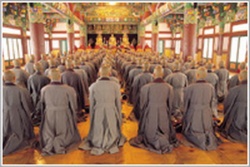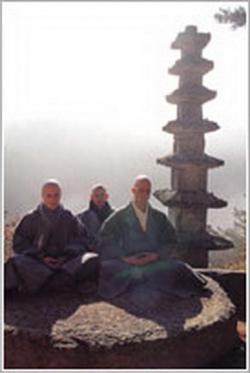Temple Stay
<poem> What is a Temple Stay?
A Temple Stay is a cultural-experience program designed to help people understand Korean Buddhism better. Temple stays offer various kinds of practicing methods such as Yebul (ceremonial service involving Chanting), Chamseon (Zen Meditation), Dado (tea ceremony) and Baru Gongyang (communal Buddhist meal service). Participants can find their 'true Self' amongst the Harmony of nature while staying at a temple. Temple Life, the experience of temples, is another program designed to help people better understand Korean Buddhism and the Life of Monks.
Devotional Chanting at Yebul, Ceremonial Service (Yebul) Yebul is a Ceremonial Service to praise Buddha. This solemn ceremonial service is held 3 Times a day; in the morning, midday and evening, helping to clear one’s Mind.
Zen Meditation (Chamseon)
Zen is known as “Seon” in Korean.
Chamseon is a Form of Meditation that allows a person to reflect about oneself.
There are two forms of this Meditation:
- Jwaseon(坐禪) : a sitting -style Meditation
- Haengseon(行禪) : a walking-style Meditation.
Communal Buddhist Meal Service (Barugongyang)
Barugongyang is a unique and special Way of eating in Korean Temples. At this communal meal practice the meal is eaten in total Silence, and not a single grain of rice is wasted. Tea Ceremony (Dado)
Making and enjoying good tea is one of the practices of the Buddhist Religion. Koreans say that there are several ways to enjoy good tea. One should start off by enjoying the sounds of water boiling, and then relax with the soothing aroma of tea and seeing its soft and subtle colors. Lastly, one can feel the warmth of the tea radiating through the cup as they slowly savor the taste. ※ There are many other Activities to participate in at Korean temples, such as Lotus lantern making, impression making with ink and paper, and folk games.

